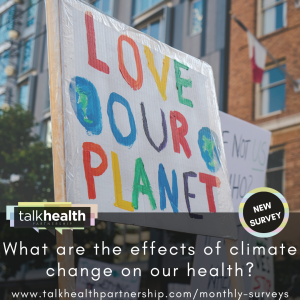Health and climate change: 'Billions of people are at risk'

Whether it’s risks to sources of food and nutrition, more heat-related deaths, increased spread of infection or negative impacts on mental health, climate change is set to have a huge role to play in the future of human health.
Earlier this year, the InterAcademy Partnership (IAP) released a report named Health in the Climate Emergency: A global perspective. Made up of a network of the world’s science academies from across Africa, Asia, the Americas and Europe, the IAP’s new release is one of the most extensive investigations of climate change and health.
The scientist note that: “Climate change is having a range of impacts on health today that will become more severe unless urgent action is taken. Vulnerable populations will see their health increasingly undermined by both direct impacts, such as from extreme heat, and indirect ones, e.g. from less food and nutrition security.”
The 141 page report covers all of the bases when it comes to protecting human health against the detrimental effects of climate change. But, we know you don’t have time to trawl through the whole document, so we have condensed everything you need to know in this five step article.
Before you read on, have you completed our new members’ survey? It’s all about climate change and health.
Take the survey and be in with a chance of winning a prize!
Step 1: Air Pollution
A 2020 study found that the loss of life from air pollution now rivals that of smoking. Shocking right? Due to the burning of fossil fuels including coal, people are more likely to suffer from cardiovascular and respiratory conditions as well as lung cancer.
As with most effects of climate change, this is a continuing issue in low income countries, whereas high-income countries have improved air quality. The report states that fossil fuel combustion must stop to level the playing field and protect future human health.
Step 2: Heat indirect and direct effects
Although lots of us enjoyed the heatwave, it didn’t go unnoticed that the extreme temperatures were a direct effect of global warming. As the heat continues to rise, it has numerous effects on our personal health and health services.
The World Health Organisation says: ‘Between 2030 and 2050, climate change is expected to cause approximately 250 000 additional deaths per year, from malnutrition, malaria, diarrhoea and heat stress.’ These are all direct effects of increased heat. However, higher temperatures can lead to slower response times, damage to buildings and infrastructure and more hospital admissions.
Step 3: Wildfires
As it gets hotter and rain falls less often, wildfires are increasingly likely. Not only do these fires cause damage to people and their homes, they also affect biodiversity and release more greenhouse gases.
It doesn’t stop there, smoke exposure causes physical health conditions including respiratory and cardiovascular disease especially in children, the elderly, those with chronic diseases. And, they can cause knock on mental health issues due to the stopping people from going outside.
Step 4: Droughts
A drought has been declared for the first time since 2018 in the UK. This has led to three of the main water companies in the country introducing hosepipe bans.
What do droughts mean for our health? Basically, all of the bad things that happen because of climate change are worsened by a lack of water. Wildfires and airborne dust are more likely leading to respiratory issues and food and nutrition are reduced due to a lack of crop. Put simply, we need to steer clear of droughts.
Read more of the report here. If you are interested in finding out more about your health and the planet, check out our talkgreen page.
Information contained in this Articles page has been written by talkhealth based on available medical evidence. The content however should never be considered a substitute for medical advice. You should always seek medical advice before changing your treatment routine. talkhealth does not endorse any specific products, brands or treatments.
Information written by the talkhealth team
Last revised: 22 August 2022
Next review: 22 August 2025
